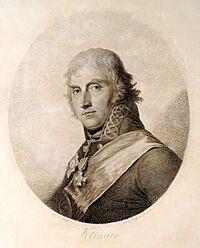Friedrich Maximilian von Klinger facts for kids
Quick facts for kids
Friedrich von Klinger
|
|
|---|---|

Klinger, 1807 etching
|
|
| Born | Friedrich Maximilian Klinger 17 February 1752 Free Imperial City of Frankfurt |
| Died | 9 March 1831 (aged 79) Dorpat, Russian Empire |
| Occupation | Dramatist, novelist, military officer |
| Language | German |
| Education | University of Gießen |
| Literary movement | Sturm und Drang |
| Notable awards |
|
| Spouse | Elisabeth Alexajef (m. 1788) |
Friedrich Maximilian von Klinger (born February 17, 1752 – died March 9, 1831) was a German writer who wrote plays and novels. His play Sturm und Drang (1776) was so important that it gave its name to a whole artistic movement called Sturm und Drang. This movement was about strong emotions and individual freedom.
Klinger was a childhood friend of the famous writer Johann Wolfgang von Goethe. He also worked as a playwright for a theater company for two years. Later, he moved to Russia and became a General in the Imperial Russian Army.
Contents
Friedrich Klinger's Life Story
Friedrich Klinger was born in Frankfurt am Main, Germany. He came from a family that was not wealthy. His father, Johannes Klinger, was a town constable. Sadly, his father died when Friedrich was only eight years old.
His mother, Cornelia Fuchs Klinger, had to work hard to support Friedrich and his two sisters. She washed laundry for rich families in Frankfurt. Even with these challenges, Klinger was a very good student. He earned a scholarship to study at a high school. He also tutored other students to help his family earn money.
Early Connections and Education
Klinger became friends with Goethe around 1773. Goethe was a big help to Klinger. He even gave Klinger money so he could study at the University of Gießen in 1774. Klinger studied law there for a short time.
Klinger's early plays, like Otto and Das leidende Weib (The Suffering Wife), were inspired by Goethe's work. A publisher even called them "plays in the Goethean/Lenzian Manner."
Becoming a Successful Playwright
In 1776, Klinger entered a play contest in Hamburg. He submitted his tragedy called Die Zwillinge (The Twins). His play won first prize! This success made him well-known. He then got a job as a playwright for the Seylersche Schauspiel-Gesellschaft, a famous theater company. He worked there for two years.
Life and Career in Russia
In 1778, Klinger joined the Austrian military. He fought in a war called the War of the Bavarian Succession. Two years later, in 1780, he moved to Saint Petersburg, Russia. There, he became an officer in the Imperial Russian Army. He was even given a noble title.
Klinger became close to Grand Duke Paul, who later became Emperor. He traveled with Paul to Italy and France. In 1785, Klinger became the director of a military school for young cadets. In 1788, he married Elizaveta Alekseyeva. By 1799, he was made the head of the Academy of Knights.
In 1803, Emperor Alexander chose Klinger to be in charge of the Universität Dorpat. He held this important job until 1817. In 1811, he became a lieutenant-general. Klinger slowly retired from his official duties. He lived many years in retirement and passed away in Dorpat, which is now in Estonia.
Klinger's Writing Style
Klinger was a strong and emotional person. The difficulties he faced when he was young greatly influenced his plays. His early play, Sturm und Drang (1776), was so powerful that it gave its name to the entire artistic movement.
Other important plays from his early, passionate period include Die Zwillinge (1776), Die neue Arria (1776), Simsone Grisaldo (1776), and Stilpo und seine Kinder (1780). Later, he wrote the two-part tragedy Medea in Korinth and Medea auf dem Kaukasos (1791).
While living in Russia, Klinger mostly wrote philosophical novels. Some of his most famous novels are Fausts Leben, Taten und Höllenfahrt (1791), Geschichte Giafars des Barmeciden (1792), and Geschichte Raphaeis de Aquillas (1793). His last major work in this series was Betrachtungen und Gedanken über verschiedene Gegenstände der Welt und der Literatur (1803). In these books, Klinger shared important ideas that came from the Sturm und Drang movement.
Friedrich Klinger's Main Works
- Faustus
- Sturm und Drang
See also
 In Spanish: Friedrich Maximilian Klinger para niños
In Spanish: Friedrich Maximilian Klinger para niños
 | Precious Adams |
 | Lauren Anderson |
 | Janet Collins |

